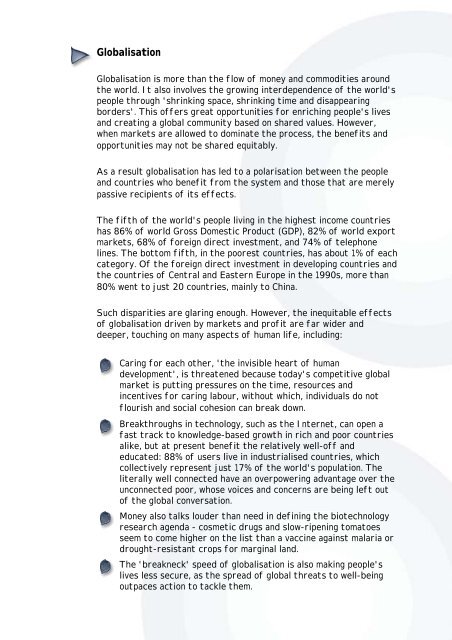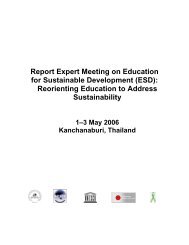Module 9 Consumer education - APCEIU
Module 9 Consumer education - APCEIU
Module 9 Consumer education - APCEIU
Create successful ePaper yourself
Turn your PDF publications into a flip-book with our unique Google optimized e-Paper software.
Globalisation<br />
Globalisation is more than the flow of money and commodities around<br />
the world. It also involves the growing interdependence of the world's<br />
people through 'shrinking space, shrinking time and disappearing<br />
borders'. This offers great opportunities for enriching people's lives<br />
and creating a global community based on shared values. However,<br />
when markets are allowed to dominate the process, the benefits and<br />
opportunities may not be shared equitably.<br />
As a result globalisation has led to a polarisation between the people<br />
and countries who benefit from the system and those that are merely<br />
passive recipients of its effects.<br />
The fifth of the world's people living in the highest income countries<br />
has 86% of world Gross Domestic Product (GDP), 82% of world export<br />
markets, 68% of foreign direct investment, and 74% of telephone<br />
lines. The bottom fifth, in the poorest countries, has about 1% of each<br />
category. Of the foreign direct investment in developing countries and<br />
the countries of Central and Eastern Europe in the 1990s, more than<br />
80% went to just 20 countries, mainly to China.<br />
Such disparities are glaring enough. However, the inequitable effects<br />
of globalisation driven by markets and profit are far wider and<br />
deeper, touching on many aspects of human life, including:<br />
Caring for each other, 'the invisible heart of human<br />
development', is threatened because today's competitive global<br />
market is putting pressures on the time, resources and<br />
incentives for caring labour, without which, individuals do not<br />
flourish and social cohesion can break down.<br />
Breakthroughs in technology, such as the Internet, can open a<br />
fast track to knowledge-based growth in rich and poor countries<br />
alike, but at present benefit the relatively well-off and<br />
educated: 88% of users live in industrialised countries, which<br />
collectively represent just 17% of the world's population. The<br />
literally well connected have an overpowering advantage over the<br />
unconnected poor, whose voices and concerns are being left out<br />
of the global conversation.<br />
Money also talks louder than need in defining the biotechnology<br />
research agenda - cosmetic drugs and slow-ripening tomatoes<br />
seem to come higher on the list than a vaccine against malaria or<br />
drought-resistant crops for marginal land.<br />
The 'breakneck' speed of globalisation is also making people's<br />
lives less secure, as the spread of global threats to well-being<br />
outpaces action to tackle them.








